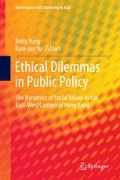Abstract
Abortion presents a moral dilemma from the perspectives of both Western and Confucian traditions. This chapter will examine how the law of Hong Kong compromises the conflicting rights and values involved in abortion. In Hong Kong, although abortion is legally permissible under certain conditions, abortion on demand is outlawed. We argue that, in order to justify this legal restriction, the law has to consider the fetus as a potential person, who has a right to life, which is close to, but not up to, that of a full-blown person. However, such restriction is incongruent with Confucian ethics, which emphasizes the harmony of the family and the community. At least, Confucian ethics would allow abortion based on social or economic reasons.
Access this chapter
Tax calculation will be finalised at checkout
Purchases are for personal use only
Notes
- 1.
Today, the viable state is around 22 weeks’ gestation.
- 2.
Chan and Tse (Chap. 2 of this book) highlight a similar conflict between individual value (i.e., the intrinsic value of life of a terminally ill patient) and the family and community value (i.e., the healthcare burden such patient may impose on family and society, thereby causing disharmony) in the case of euthanasia.
- 3.
For a discussion of the possible moral difference between killing and letting-die in this book, see the section in Chan and Tse’s chapter on active and passive euthanasia. Chan and Tse also discuss the difference between withdrawing and withholding medical treatment.
- 4.
Even though the fetus is not a full-blown human being, it is a stage a full-blown human being must go through. So its value can be derived from that of a full-blown human being.
- 5.
The reason is that abortion is not a real option (because of medical and technical limitations) until modern time. In the past, the closest equivalent to abortion was infanticide.
- 6.
In China and Singapore, there is even no need to give any reasons in order to have abortion.
- 7.
Although Liu (1992, 282) argues that the wide wording of the abortion law may provide adequate scope to accommodate the practice of abortion on economic ground, no one has ever succeeded in challenging the law based on this interpretation.
- 8.
Liu points out that “[s]uch a formulation can, however, be interpreted as allowing abortion on demand: statistics show that maternal mortality is greater than the mortality rate from abortion during the first trimester” (1992, 281). But no one has ever succeeded in challenging the law based on this interpretation.
- 9.
Accepting this will provide a strong reason to accept stem cell research for medical advance.
- 10.
For a discussion of the variety of values and the possible ways to handle multiple values, see Yu’s chapter in this book, pp. 205–206 in particular.
- 11.
Regarding pregnancy resulting from incest, in most cases, the mother is either underage or a rape victim. Consequently, she does not need to bear the responsibility of bearing the fetus. Hence, abortion is permissible.
- 12.
Thomson (1971) has a more detailed discussion in this issue.
- 13.
This is also true for Aristotle’s virtue ethics.
- 14.
Of course, whether choosing abortion or not is up to the mother. To force the mother to abort the fetus will harm her mental health and cause disharmony to her family.
- 15.
Recall that gestation is a process of gradual development. No sharp line in psychology and physiology can be drawn between a fetus just before birth and a newborn baby.
- 16.
She thinks that the fetus and the newborn baby are potential persons.
- 17.
Although Warren’s argument is more like a science fiction, we cannot reject her argument by simply pointing out that her thought experiment can never be true because many phenomena described by scientific theories, e.g., gas laws, also can never be true.
- 18.
The same argument applies to killing and eating animals.
References
Brody, B. (1972). Thomson on abortion. Philosophy and Public Affairs, 1(3), 335–340.
Ivanhoe, P. (2010). A Confucian perspective on abortion. Dao, 9, 37–51.
Liu, A. (1992). The right to life. In R. Wacks (Ed.), Human rights in Hong Kong. New York: Oxford University Press.
Quinn, W. (1989). Actions, intentions, and consequences: the doctrine of doing and allowing. Philosophical Reviews, 98, 287–312.
Rachels, J. (1975). Active and passive euthanasia. The New England Journal of Medicine, 292, 70–80.
Thomson, J. (1971). A defense of abortion. Philosophy and Public Affairs, 1, 47–66.
Warren, M. (1973). On the moral and legal status of abortion. Monist, 57, 43–61.
Author information
Authors and Affiliations
Corresponding author
Editor information
Editors and Affiliations
Rights and permissions
Copyright information
© 2016 Springer Science+Business Media Singapore
About this chapter
Cite this chapter
Cheng, KY., Ming, T. (2016). The Justification of the Abortion Law in Hong Kong: A Comparative Study. In: Yung, B., Kam Por, Y. (eds) Ethical Dilemmas in Public Policy. Governance and Citizenship in Asia. Springer, Singapore. https://doi.org/10.1007/978-981-10-0437-7_3
Download citation
DOI: https://doi.org/10.1007/978-981-10-0437-7_3
Published:
Publisher Name: Springer, Singapore
Print ISBN: 978-981-10-0435-3
Online ISBN: 978-981-10-0437-7
eBook Packages: EducationEducation (R0)

